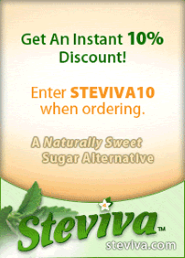Which natural sweetener is the best substitute for sugar? We compare the most common naturally-derived sugar replacements on the market.
Click on the 'plus' sign to see more sweetener properties and on the sweetener name to view products for sale through our site.
| Sweetener | Sweetness*[a] |
Calories* (kcal/g) |
Carbohydrates |
Glycaemic Index* |
Prebiotic Function*[c] |
Dental Decay* |
Key Ingredient |
Form |
|---|---|---|---|---|---|---|---|---|
| Stevia (Leaf) | 64 | 3.7 | med | 0 [b] | No | No [b] | Steviol Glycoside | Dried Leaf Cut / Powder |
| Stevia Extract (Reb A) | 252 | 0 | none | 0 | No | No | Steviol Glycoside | Powder / Liquid |
| Stevia Extract (Stevioside) | 147 | 0 | none | 0 | No | No | Steviol Glycoside | Powder / Liquid |
| Crystalline Fructose | 1.10 | 3.7 | high | 19 | No | Yes | Fructose | Granulated |
| Erythritol | 0.60 | 0.2 | low | 0 | No | No | Polyhydric Alcohol | Granulated |
| Fructooligosaccharides(FOS) | 0.43 | 1.5 | low | 1 [b] | Yes | Yes | Fructose / Glucose | Powder / Granulated |
| Monk Fruit (Luo Han Guo) | 250 | 0 | none | 0 | No | No | Mogroside | Powder / Liquid |
| Xylitol | 0.91 | 2.4 | med | 12 | Yes | No | Polyhydric Alcohol | Granulated |
| Agave Nectar | 1.40 [b] | 3.1 | high | 13 | No | Yes | Fructose / Glucose | Syrup |
| Dextrose | 0.60 [a1] | 3.4 | high | 100 [b] | No | Yes | Glucose | - |
| Glycerol | 0.78 [b] | 4.3 [b] | med | 3 [b] | No | No | Polyhydric Alcohol | - |
| Inulin | 0.1 [b] | 1.5 | low | 1 [b] | Yes | Yes | Fructose / Glucose | - |
| Lactose | 0.4 [b] | 3.9 [b] | high | 46 | Yes | Yes | Galactose / Glucose | - |
| Maltodextrin | 0.05 - 0.70 [b] | 3.8 [b] | high | 91 | No | Yes | Glucose | - |
| Sugar (Sucrose) | 1 | 3.9 | high | 68 | No | Yes | Fructose / Glucose | - |
| Trehalose | 0.45 [a1] | 4 | high | 72 | Yes | No | Fructose / Glucose | - |
|
* Unless otherwise noted, the references used to determine the values of this property can be found
here.
[a] The sweetness value is a mean value from the results of a number of
scientific trials. This is the sweetness potency relative to sugar (sucrose) in tests using 4% to 6% SE (sucrose equivalencies), in a water solution.
[a1] Sweetness potency relative to sugar (sucrose) at 10% SE (sucrose equivalencies), in a water solution, from scientific source.
[b] Scientific source unavailable.
[c] Significant prebiotic function.
The information in this table is intended for informational purposes only, please refer to our disclaimer.
|
||||||||



